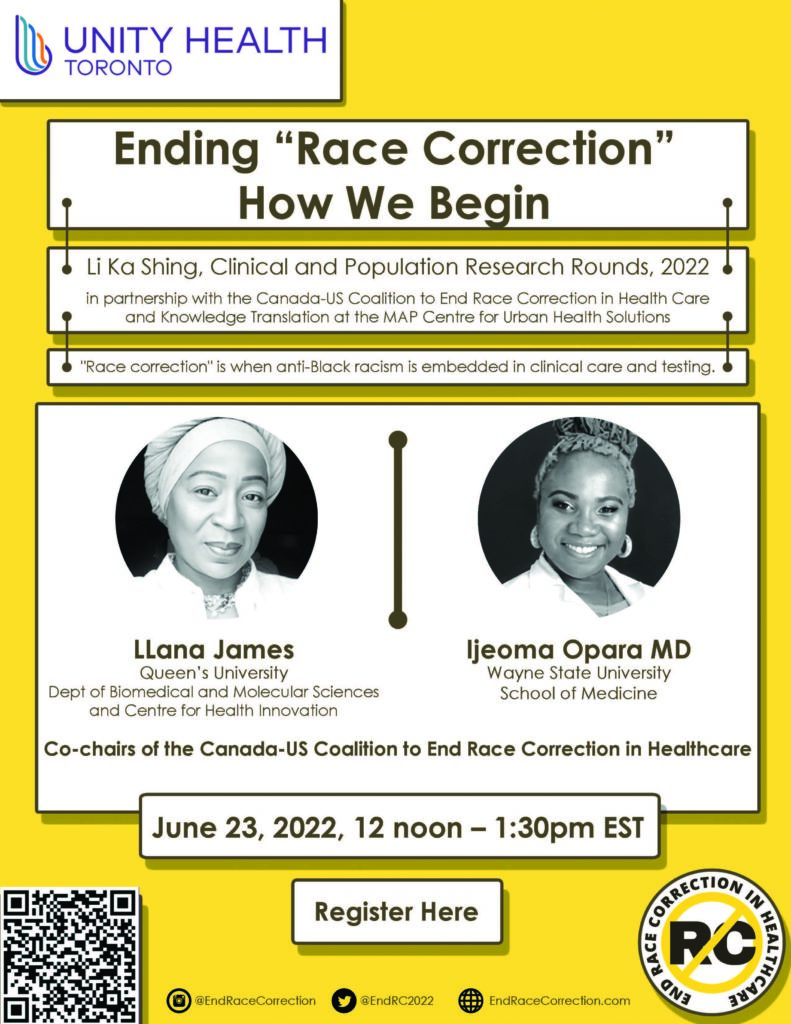Li Ka Shing, Clinical and Population Research Rounds, 2022
Ending the Practice of “Race Correction” in Health Care speaker series as part of the Li Ka Shing, Clinical and Population Research Rounds, 2022
Presented by Dr. Patricia O’Campo, Executive Director of the Li Ka Shing Knowledge Institute at Unity Health Toronto, in partnership with the Canada-US Coalition to End Race Correction in Health Care and Knowledge Translation at the MAP Centre for Urban Health Solutions.
Date and time of this virtual talk: June 23rd, 2022 from 12 pm – 1:30 pm EST
Please click here for a video recording of the talk.
About this talk: LLana James and Ijeoma Nnodim Opara MD, FAAP, FAIM are the co-chairs of the Canada-US Coalition to End Race Correction. Together, they will outline a process for ending the complex, multi-level, entrenched practice of “race correction” in health care. In particular, they will describe what health care providers and organizations can do to demonstrate they are ready to begin the process of de-adopting race correction across specialties and departments.
While intervention science always requires a thoughtful, systematic approach, this is particularly important when the intervention challenges the status quo of white supremacy. Often, attempts to shift this status quo in health care settings are met with resistance, and the reality of anti-Black racism in health care is erroneously framed as a “matter of opinion”, when in fact it is a matter of human rights.
We invite everyone to explore the UN Report of the Working Group of Experts on People of African Descent on its mission to Canada.
Space is limited, please register here.
What is race correction? Health care providers often use tests to assess a patient’s health. In many cases, health care providers calculate test results differently for Black patients than they do for everyone else. Overall, race correction means that Black people are diagnosed late, or never diagnosed at all, for serious conditions from heart, kidney and lung diseases to cognitive impairment. It also means that Black people are systematically excluded from timely access to life-saving treatments like organ transplants and other surgeries. Race correction has no scientific basis because “race” is not biological. It is a social construct that is applied differently in different times and in different places. In fact, scientists have shown us that people have more in common genetically across “racial” groups than within them. For more about race correction, please see the primer attached.
Speaker bios:
LLana James’ research illuminates how technology can undermine or bolster human rights in the context of clinical care, rehabilitation science and public health. Her interdisciplinary and applied approach is designed to critically appraise current applications of technology while developing and implementing interventions that seed new, ethical futures. To accomplish this, LLana brings together academic and community scholars across disciplines and sectors to work at the intersections of medicine/clinical care, public health, data, AI, law, and race-ethnicity across multiple axes, e.g., gender, class, able-bodiedness. As a result of her ground-breaking work, she is the inaugural AI, Medicine and Data Justice Post-Doctoral Fellow at Queen’s University.
Dr. Ijeoma Nnodim Opara MD, FAAP, FAIM is a double-board certified physician and Assistant Professor of Internal Medicine and Pediatrics at Wayne State University School of Medicine and Wayne Health. Her mission in life is to dismantle white supremacist delusion by eliminating anti-Black racism in medicine, health care and public health while centering and celebrating Black brilliance, abundance and joy. She is the founding director of the “Health Equity and Justice in Medicine” initiative, co-founding director of Wayne State University Global Health Alliance and co-creator of the Global Urban Health and Equity curriculum for resident training at Wayne State University’s School of Medicine. She is a member of the White House Office of Public Engagement Healthcare Leaders in Minority Health where she advises on anti-racism, health justice, and health equity. Dr. Opara is a speaker, consultant, coach and facilitator and hosts a weekly Twitter Spaces roundtable: Antiracism in Medicine Action Roundtable #AIMART, a transdisciplinary community of Black leadership to eliminate anti-Blackness from medicine, healthcare and public health.

Below please find important background materials:
If you have any questions, please email LKSKIResearch@unityhealth.to